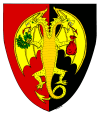New to the SCA and want to know more about what to expect at your first event? Here are some simple suggestions to get you started.
Introduction
Contents
First, let me start by pointing out there are a lot of activities in the SCA that are informal — no special clothing or equipment are needed, and there’s no cost for these. Just show up, hang out, ask questions, and learn! This includes our weekly Dragon’s Laire social gathering and fight practices (link to more info), our annual Newcomers’ Night in June (link to more info), and the spring/fall Arts & Sciences Day Camps (link to more info). Nearby Baronies and Cantons have similar gatherings.
And, of course, we never expect the audience at a public demonstration to dress up!
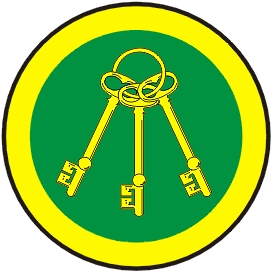
Second, you should know that every SCA branch has someone who has volunteered to help out newcomers, the Chatelain(e). Our Chatelaine is Aoife Aileanach (that’s an email link). Wherever you live, the local Chatelaine can help connect you to people who share your interests.
Finally, this article is part of the Barony of Dragon’s Laire newcomers’ welcome series. You can find other resources at “Helpful Pages for Newcomers“.
This article is to get you started with Events — with a capital E!
Events With a Capital E
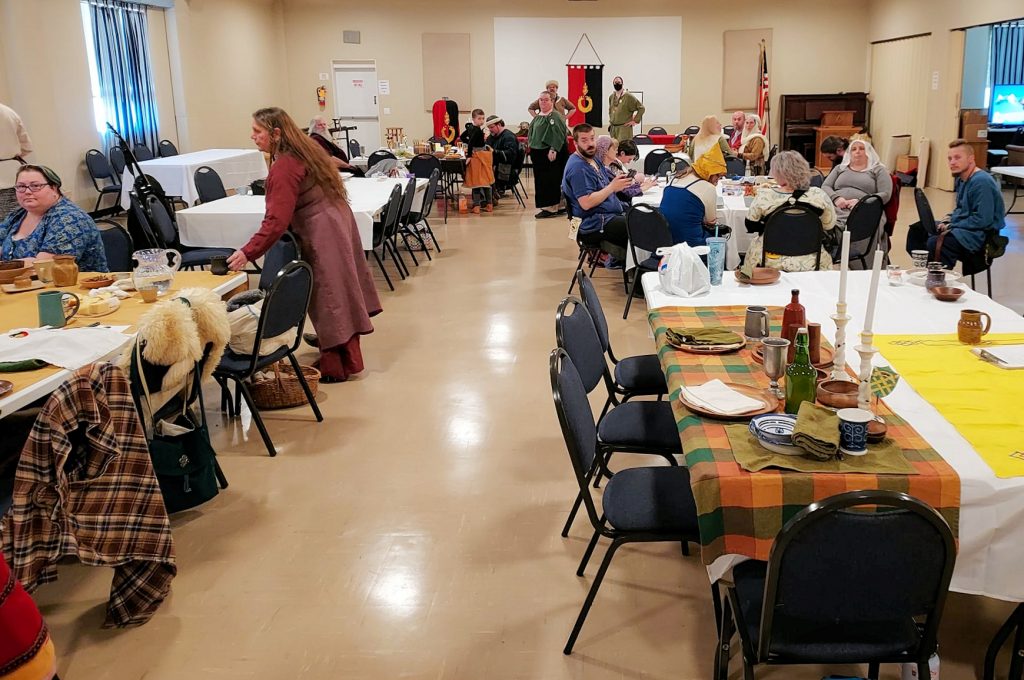
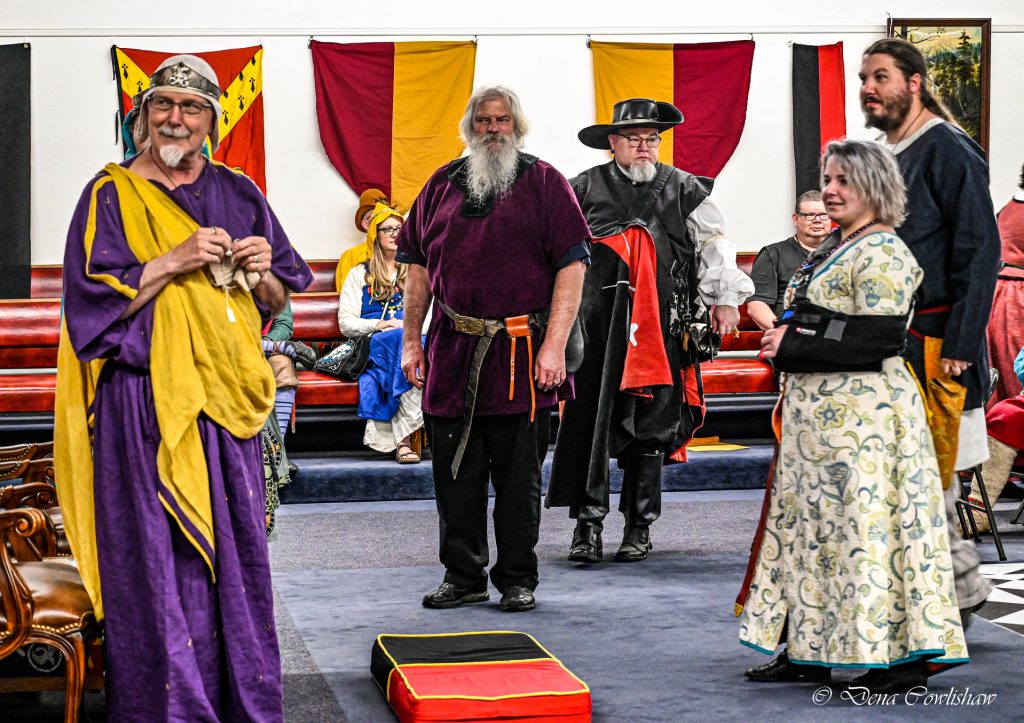

All of the Events in the SCA ask you to dress in garb, something that looks like clothing from before 1600CE. But don’t fear – garb doesn’t have to be fancy, and there’s help available if you want it! More on that below.
Events usually include several parts. You can watch if you want, or you can jump in and participate. Common activities include:
- Court. The hosting Baron/Baroness or King/Queen will make a short speech, present awards and acknowledgements, and announce the winners of any competitions. Audience participation is part of the experience!
- Marshallate activities. This broad category includes armored fighting, rapier fighting, archery and crossbows (target or combat styles), thrown weapons (spears, knives, and axes), and siege weapons. Click here to learn more about the Marshallate.
- Arts & Sciences (A&S) activities. Demonstrations and presentations about medieval history, arts , crafts, cooking, or sciences. Decorative, fine, and performing arts are all part of the SCA. Guilds help people with similar interests gather together. Click here to learn more about A&S.
- Bardic activities (performing arts) are common, including music, dance, dramatic performances, recitations, and story-telling. Sometimes these are a scheduled part of the event, and sometimes a bardic circle will spring up around an evening campfire.
- There are often hands-on classes where you can learn how to make or do something. These may have a small fee for materials or a list of materials you should bring. You may be asked to sign up in advance.
- Games played in the past (board games and the like) may be available for you to learn and to play.
- There are usually some special activities for kids and families — Youth and Family Activities, or YAFA — such as crafts or a scavenger hunt.
- Overnight camping events are common in the summer months. There are usually different sections for historical tents, modern tents, RV’s, and ADA access.
- Feasts featuring medieval food are more common in the winter, when we rent indoor sites with kitchens. You are expected to bring your own feast kit (table setting). You will probably need to sign up in advance.
Kids and Families
The SCA is very welcoming to all ages, including to children of all ages. But there are a few important things you should know.
- Anyone under the age of majority (18 yrs in the USA, 17 yrs in Canada) must be accompanied by a responsible adult — their parent, guardian, or a designated representative.
- A parent/guardian must sign a waiver for the SCA, approving their children’s participation. Participation in armored martial arts, any combat-related activities, combat-archery, or fencing requires additional parental consent.
- There is another form that parents/ guardians can use to give permission for other adults to accompany their children (and to act as their agent, in case medical care is needed for some reason).
- Pro tip: You can fill out multiple copies of the form, so that multiple adults can accompany the same minor. For example, if two families in the SCA are friends, the adults of each family can fill out this form for each other. Or the parent of a youth fighter can designate several adult fighters as suitable representatives.
- Click here to fill out and print the SCA forms for the participation of minors.
For more information about minors in the SCA, including minimum ages for youth combat, please visit the SCA website.
What Name Will You Use?
Everyone has a name they use within the SCA, often a different one than their modern (legal) name. You will also want a name that you can use to introduce yourself to other SCAdians (people in the SCA) — and to put on any pre-registration forms that the Event may require.
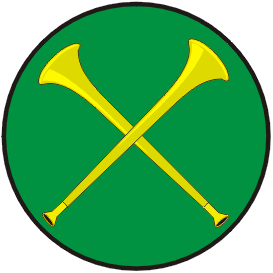
SCA names are ideally historical, inspired by a time and a place that appeals to you. Lists of common names are provided by the College of Heralds (click this link to explore names). You can also use your actual first name and introduce yourself as “MY-FIRST-NAME of Dragon’s Laire”.
You can change your name later if you want, of course.
Once you have a name that you know you want to keep, you can talk to our Baronial Herald and go through the optional process of registering your name and designing arms to go with it. Learn more about heraldry here.
Registering and Checking In
SCA events usually have a site fee that covers the cost of renting the space, buying food, etc. We are a non-profit organization, and site fees are kept as low as possible. You do not need an official SCA membership card to attend, but if you have one, you typically save $5 (adult cost) per event. Kids enter for free in Dragon’s Laire!
The site fee covers almost everything, but there may be additional fees for optional add-ons: meals, class materials, or camping. These will be clearly described in the event info. Camping usually has a second pre-registration step, where you describe your camp size and type and indicate which group you want to camp with – Dragon’s Laire, of course! Some people call this step a land grab.
Many events offer online pre-registration and, more and more frequently, a PayPal billing option. Registering and paying at the door works, too, but the on-site registration station (Gate) can usually only accept cash or checks.
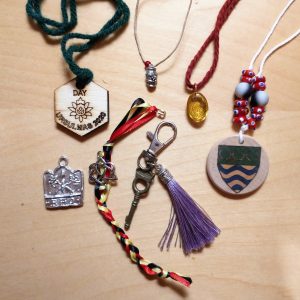
When you arrive at the event, your first stop will be Gate — whether you pre-registered or not. This is where you pay any remaining fees and sign in that you’ve arrived. You will also be given a site token, which shows that you have signed in for the event and belong there! Please wear your token somewhere visible. Site tokens are unique for every event, and many people in the SCA collect these and display them in fun ways.
There may be additional, on-site, sign-up sheets for classes or combat activities. These are usually in a different location than the Gate, but the people who check you in can give you directions. Never feel shy about asking your last-minute questions when you check in at Gate!
What to Wear
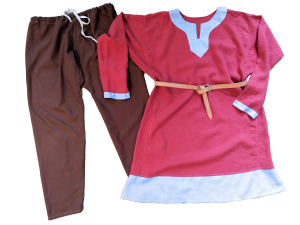
Garb — “an attempt at pre-17th century clothing” — is required for SCA events. It can be as simple or as complicated as you like. The internet is full of MANY videos and articles, offered by SCAdians, to help you get started with medieval clothing. Or you can borrow garb for an event (see Gold Key, below), or purchase an outfit, or go to an in-person SCA class on sewing medieval clothing.
Although medieval youth dressed much like miniature adults, there’s a lot of flexibility in the SCA for modern kids to wear what they find comfortable.
Our Chatelaine’s office has a Gold Key program, where you can reach out to our officer and borrow garb for an event. Email our Gold Key Deputy (Jessy Gateman ) or Chatelaine (Aoife Aileanach
) for help.
You also want shoes that you can walk in all day. Many people wear modern shoes — for comfort, cost, or medical reasons. Historical shoes can be a great detail, though! Modern foam insoles can be cut to fit into historical shoes. Or use shoe covers to make modern shoes look a little less modern. Some modern styles are simple in style and do not stand out. And long gowns cover up your feet, anyway!
What to Bring
For All Types of Event
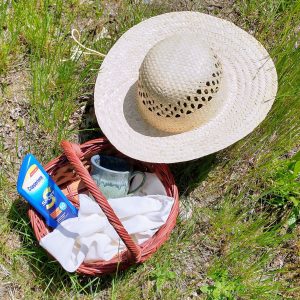
- A water bottle and/or drinking cup. Most events will have a coffee station or a water refill station, but you need to bring your own container.
- Snacks or lunch, if food is not provided, or a plan to leave the site and buy lunch somewhere. Re-entry is allowed — just keep your site token on.
- Sunscreen in the summertime. Straw hats are great too.
- A way to carry your keys and phone and other stuff… ideally something that looks not-too-modern: baskets with a cloth thrown over the top, satchels, belt pouches, and water bottle holders.
- ALWAYS pack your medical equipment or supplies, whatever you might need during the event. Eyeglasses, prescription medications, epi pens, etc.
- Print out a schedule of events (or save this to your phone) if the site has poor internet service. Many of our summer events are at rather remote sites!
- Optional but nice to have: a folding chair or picnic blanket for outdoor events. This is especially useful around the combat fields. Tag your chair with your name in case you forget it, so that lost-and-found can reach out to you.
For Combat and Target Practice
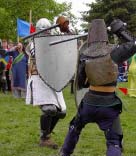
The SCA has a wide variety of Marshallate activities, inspired by medieval martial traditions. Combat-oriented options include: heavy/armored combat, rapier combat, and combat archery/crossbow. Target-oriented options include: archery/crossbow, thrown weapons (spears, axes, and knives), and siege weapons. There are adult and youth age categories.
Martial activities in the SCA have safety requirements, regarding armor and weapons, that might make it difficult for you to participate at your first event. (All combat styles require armor suitable for the activity.) But you are certainly welcome to watch! There are often people on the sidelines who will answer questions and give you advice on how to get started. There may even be loaner gear available for you to try out.
The best way to get hands-on experience is to attend Dragon’s Laire’s weekly fight practice. You can meet our fighters, learn the rules for safe combat, and arrange with the Marshal in Charge of your activity to bring loaner gear on nights when you can attend. Click here for a list of the Marshals for Dragon’s Laire.
For a Feast
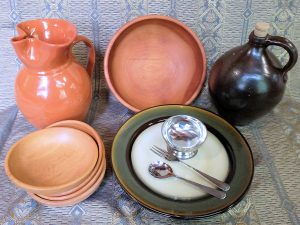
- Feast kit — bring your own place setting. This includes a cup, plate, bowl, eating utensils, napkin, and some way to carry those items. Wood or home-made ceramic or plain-looking stoneware dishes work best, whether made by an artisan or scrounged up at a thrift store.
- There is sometimes a place in the kitchen to wash up before you leave. Just in case, also bring a plastic bag — you can wrap up your dirty dishes and take them home to wash.
- Optional but fun: a goblet or second cup, a water pitcher, battery-operated candles and candleholders (many of the sites we rent do not allow open flames), and a small tablecloth.
For Classes and Presentations
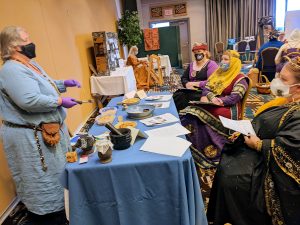
- Bring a way to take some notes. You may learn about specific reference books, websites, materials, or instructors that you want to jot down for later.
- Many classes have handouts that you can take with you.
- Materials for hands-on classes. These classes may have a list of supplies you should bring with you – or an optional materials cost paid to the instructor. These requirements will be published in advance, as part of the class description.
- Copy of the class schedule. But be mindful of last-minute schedule changes, and sometimes a class space might be running behind schedule. Ask if you’re uncertain where/when to find the class you want!
For Overnight Camping
- At a minimum, you need a tent and a sleeping bag. Modern camping equipment is just fine — there will be separate areas designated for medieval pavilions (up front and visible) and modern-style tents (tucked away a bit). Most sites also have some RV camping spaces. ADA-friendly camping zones are usually available.
- Camping areas will have porta-potties (biffies) and some water sources available. Some sites have flush toilets or shower facilities. The event information should help clarify what amenities are available.
- Bring an empty gallon jug for water so you don’t have to walk to the faucet too frequently.
- Bring something easy for breakfast and decide which other meals you want to purchase versus cook on your own. Almost all sites allow propane cooktops, but open fire is restricted through much of the summer season.
- Optional: earplugs, if you anticipate wanting to sleep before the nighttime festivities wear down.
- For a much more detailed packing list for camping in the SCA, visit http://antir.sca.wiki/index.php?title=Camping
What to Expect – SCA Etiquette
The SCA has some cultural norms that are meant to contribute to the medieval-ish experience. Most you will learn as you go, but a few big ones to start with:
Court
For new members, this is like watching a theatrical event. Just follow along. If the whole crowd stands up, or sits down, or cheers or claps, do that! Generally, court will open with some welcoming words from the hosting Baron/Baroness or King/Queen. At the Opening Court for an event, there might be a call to ask who will compete that day – and at the Closing Court, the announcement of the winners. If you want to see what Court looks like, the Dragon’s Laire YouTube channel has some recordings you can watch.
Forms of address
Everyone in the SCA portrays some sort of nobility, but the higher ranks are earned by deeds or by combat prowess. Those people have earned the right to wear crowns/coronets with various embellishments – the so-called “shiny hats.”
As you get more involved with the SCA, you will learn that each rank has a specific form of address, but to begin with, you can simplify and address anybody as: “milord,” “milady,” or “my good gentle“.
Heraldry
Heraldry – the use of medieval-style banners and devices – not only looks great, it also helps you locate people or groups at an event. Your Baron/Baroness and King/Queen’s location will be indicated by banners.
Here are our Baronial devices. If you see these hanging or flying at an event, come say hello to your fellows!

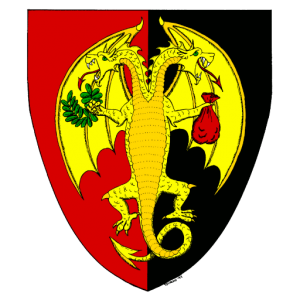
Bowing and Curtseying
In this Kingdom, it’s traditional to briefly bow to the Royal throne (when those chairs are set up and the heraldry is flying), even if they are empty. This is just part of the Medieval tone of the event. Some people choose to bow in other circumstances, to acknowledge or honor someone passing by, so don’t be surprised if you see this happening.

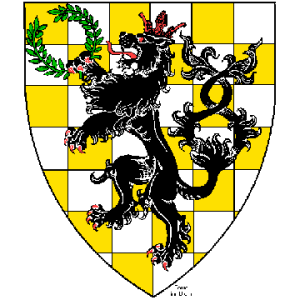
Volunteering
Volunteering, as a newcomer? Absolutely!
This is an all-volunteer organization, and everyone is always happy to have a helping hand. This is a surprisingly quick way to meet other people in the SCA. No small talk or awkward conversational lulls, just a simple chore and the camaraderie of working together.
How do you get started? If you hear an announcement asking for help, or perhaps you just see someone struggling to set up a tent or carry too many items, step forward and introduce yourself.
If in doubt, just ask someone!
Finally, people will be more helpful if they know you want help! Admit you’re new and ask questions. Ask about what is happening in court or in combat, ask questions about somebody’s craft, etc. Most people love their “geek”, and they love to talk about it.
Links To Other Sites for Newcomers
The SCA has a general guide to help you get started (PDF download).
This article is part of the Barony of Dragon’s Laire newcomers’ welcome series. You can find other resources at “Helpful Pages for Newcomers“.
